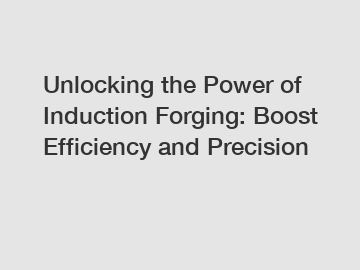Unlocking the Power of Induction Forging: Boost Efficiency and Precision
Unlocking the Power of Induction Forging: Boost Efficiency and Precision.
Induction forging, a technique widely used in the manufacturing industry, has revolutionized the forging process by enhancing efficiency and precision. Through the power of electromagnetic fields, this advanced method has proven to be highly effective in shaping metal parts, reducing wastage, and ensuring consistent quality. In this article, we will delve into the various advantages of induction forging and how it can benefit your manufacturing operations.
Boosting Efficiency through Rapid Heating.

One of the key advantages of induction forging is the rapid and controlled heating it provides. Traditional methods often require lengthy heating times, which can slow down the production process. Induction forging, on the other hand, eliminates the need for preheating and significantly reduces the time required to reach the desired temperature. This not only saves time but also reduces energy consumption, making it a cost-effective solution for manufacturers.
Achieving Precision with Uniform Heating.
When it comes to forging, precision is of utmost importance. Induction forging ensures uniform heating throughout the metal part, resulting in consistent quality and minimizing potential defects. The controlled and localized heating provided by induction reduces the risk of overheating or underheating, preventing material distortion and ensuring accurate shaping. This level of precision contributes to improved product quality, reducing the need for costly rework or material wastage.
Enhanced Material Flexibility.
Another significant advantage of induction forging is the flexibility it offers in terms of materials that can be shaped. This technique is compatible with a wide range of metals, including stainless steel, aluminum, copper, and titanium. The ability to work with various materials expands the possibilities for manufacturers, allowing them to produce a diverse range of products efficiently and accurately. Whether you require complex shapes or intricate designs, induction forging can handle the challenge.
Improved Safety for Operators.
The safety of operators is always a top priority in any manufacturing environment. Induction forging addresses this concern by eliminating the need for open flames or contact heating methods. The electromagnetic fields used in induction heating are safe and non-contact, ensuring a hazard-free workspace. Additionally, the controlled heating reduces the risk of accidents caused by overheating or rapid temperature changes. By enhancing safety for operators, induction forging not only protects their well-being but also contributes to higher productivity.
Conclusion.
Induction forging is a game-changer in the manufacturing industry, offering significant advantages in terms of efficiency, precision, material flexibility, and operator safety. Its ability to rapidly heat metal parts, guarantee uniform heating, and work with various materials makes it an invaluable tool for manufacturers seeking to streamline their operations and improve their product quality. By harnessing the power of electromagnetic fields, induction forging boosts productivity while reducing wastage, energy consumption, and the need for rework.
If you are looking to unlock the potential of induction forging for your manufacturing operations, contact us today. Our team of experts can provide you with guidance, information, and support to implement this advanced technique effectively. Experience the benefits of induction forging firsthand and take your manufacturing processes to new heights of efficiency and precision.
Contact us to discuss your requirements of capacitor for induction heater, shaft induction hardening machine, induction pipe. Our experienced sales team can help you identify the options that best suit your needs.
128
0
0


Comments
All Comments (0)